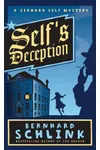Picture a German storyteller who wove legal expertise and haunting tales of love, guilt, and history into an international sensation—meet Bernhard Schlink! Born in 1944, this lawyer-turned-novelist captured the world’s heart with his 1995 bestseller, The Reader, a profound exploration of post-war Germany that became an Oscar-winning film. With a knack for blending courtroom drama and moral complexity, Schlink’s stories invite readers to wrestle with the past while savoring a gripping narrative.
The Making of Bernhard Schlink
Bernhard Schlink was born in Großdornberg, near Bielefeld, Germany, the youngest of four children. Raised in Heidelberg from age two, he grew up in a scholarly household—his father, Edmund Schlink, was a renowned Lutheran theologian and professor, while his mother, Irmgard, brought a Swiss perspective. This intellectual environment sparked Schlink’s curiosity early on. He studied law at Heidelberg University and the Free University of Berlin, graduating in 1968. By 1988, he was a judge at the Constitutional Court of North Rhine-Westphalia, and in 1992, he became a professor of public law and legal philosophy at Humboldt University, Berlin, retiring in 2006. His legal career laid the groundwork for his writing, infusing his novels with sharp insights into justice and morality.
Bernhard Schlink’s Unforgettable Stories
Schlink’s writing career kicked off with detective novels featuring Gerhard Selb, a private investigator with a Nazi-era past. The trilogy—Self’s Punishment (1987, co-written with Walter Popp), Self’s Deception (1992), and Self’s Murder (2001)—blends gritty crime with reflections on Germany’s historical guilt. His breakthrough came with The Reader (1995), a semi-autobiographical novel about a teenager’s affair with an older woman, later revealed as a former concentration camp guard. Translated into 39 languages, it was the first German book to top the New York Times bestseller list, earning awards like the Hans Fallada Prize. Schlink’s later works, like Flights of Love (2000), a short story collection, and The Woman on the Stairs (2016), explore love, loss, and memory with his signature clear, reflective prose. His style, shaped by his legal background, is precise yet emotionally resonant, tackling themes of collective guilt and personal redemption.
Schlink’s ability to humanize complex characters sets him apart. In The Reader, Hanna’s illiteracy adds nuance to her moral culpability, prompting readers to question justice and forgiveness. His narratives, often set against Germany’s post-war reckoning, resonate globally for their universal themes of love and accountability.
Why Bernhard Schlink Matters
Bernhard Schlink’s impact lies in his fearless exploration of Germany’s Nazi past and its ripple effects on modern identity. His works have sparked global conversations about collective guilt, earning him the 2014 Park Kyong-ni Prize. By blending legal precision with literary depth, he bridges genres, appealing to both crime fiction fans and literary scholars. The film adaptation of The Reader, starring Kate Winslet, brought his storytelling to a wider audience, cementing his cultural significance. Schlink’s introspective narratives continue to inspire readers to confront history with empathy and curiosity.
About Bernhard Schlink
- Born: July 6, 1944, in Großdornberg, Germany
- Key Works: The Reader, Self’s Punishment, Flights of Love, The Woman on the Stairs
- Awards: Hans Fallada Prize (1997), Prix Laure Bataillon (1997), Park Kyong-ni Prize (2014)
- Fun Fact: Schlink splits his time between Berlin and New York, teaching at Cardozo Law School.
Snag The Reader or dive into the Gerhard Selb trilogy to experience Bernhard Schlink’s gripping blend of mystery and moral reflection!











